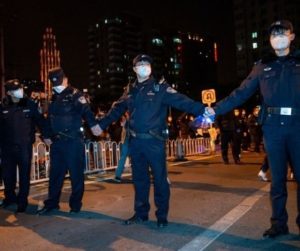Could it be possible that the world is seeing the beginning of the end of tyranny in countries like China and Iran? It seems a farfetched proposition, but over the past couple of months, citizens in these countries have won unlikely victories against authoritarianism in their governments. The digital age has granted more people the ability to air their grievances on a global scale, and that’s quite a problem for those seeking to retain their power through state force.
Unrest in Iran
 After two months of widespread protests in Iran, the Islamic Republic announced it is making what could be a significant concession to those advocating for women’s rights under the oppressive regime. The country’s attorney general recently declared that the government is abolishing its morality police, one of the driving issues for the national demonstrations.
After two months of widespread protests in Iran, the Islamic Republic announced it is making what could be a significant concession to those advocating for women’s rights under the oppressive regime. The country’s attorney general recently declared that the government is abolishing its morality police, one of the driving issues for the national demonstrations.
Attorney General Mohammad Javad Montazeri on Dec. 3 announced that this religious enforcement arm “was abolished by the same authorities who installed it.” The declaration was seen by many as a critical win for protesters.
The protests began in September after a 22-year-old woman named Mahsa Amini died in police custody for not properly covering her hair, as is the law in Iran. Women are mandated to wear a hijab or other such garment to conceal their heads in public. One of the officers beat her with a baton for violating this rule. She later died at the police station. The authorities claim she succumbed to a heart attack and aired footage showing her collapsing in the facility.
The Iranian regime responded to the ensuing protests with brutal force, killing more than 400 people and arresting tens of thousands for participating in demonstrations against the Islamic Republic. Many women were part of the movement, openly defying the head-covering orders. Images and video footage went viral on social media, giving the rest of the world an up-close look at what was happening in the country.
Despite making the concession, Montazeri indicated the government retains the authority to restrict “social behavior.” Nevertheless, it is reviewing its head scarf regulations and said leadership would make a decision on the issue within 15 days.
China Reconsidering COVID Policy?

(Photo by Stringer/Anadolu Agency via Getty Images)
In China, citizens are fed up with the draconian lockdown orders imposed by the Chinese Communist Party (CCP) as part of its “Zero-Covid” policy. The state forced civilians to remain in their homes ostensibly to ensure that no more people would be infected with the virus.
On Nov. 25, Chinese dissidents took to the streets to demonstrate against their government’s heavy-handed policies. The backlash erupted after a fire in an apartment building in Urumqi killed at least ten people. It was suspected that locked doors and other state actions hampered the efforts of firefighters and prevented victims from escaping as the conflagration consumed the building.
Citizens protested in Shanghai and Beijing, demanding an end to the policies, which had also prevented people from going to work. Many clashed with police officers. These cities, along with others, responded by relaxing some restrictions, allowing people to ride on buses and subways without having to take a test. In other areas of the country, the CCP is slowly allowing people to go back to work.
NPR reported:
“A community in the capital Beijing also allowed Covid cases with mild symptoms to isolate at home, according to a Reuters report — a far cry from protocols earlier this year which saw entire buildings and communities locked down, sometimes as a result of just one positive case.
“Other major cities like Shanghai and Chongqing also saw some rules relaxed.”
Hu Xijin, a former state media editor, noted that China was “speeding up to cast aside large-scale lockdowns.”
A Victory Against Authoritarianism?
In Iran and China, citizens have made their voices heard in a way their governments could not ignore. It might be tempting to consider that these examples portend a people’s victory over government authoritarianism. It might be the case. But we should not immediately assume a sea change is taking place.
In response to the Iranian attorney general’s announcement, Persian activist and journalist Masih Alinejad cautioned against early celebration in the wake of the concession. On Twitter, she wrote:
It’s disinformation that Islamic Republic of Iran has abolished it’s morality police. It’s a tactic to stop the uprising.
Protesters are not facing guns and bullets to abolish morality police or forced hijab.They want to end Islamic regime.#MahsaAmini
pic.twitter.com/qRcY0Kaepc pic.twitter.com/6ShBqnSbMn— Masih Alinejad 🏳️ (@AlinejadMasih) December 4, 2022
Moreover, most of China still remains under strict COVID lockdown, and the CCP could reinstate its relaxed standards at any moment. Nevertheless, it is difficult to imagine that the people of these countries could have accomplished even this before the digital age. While the final results of the protests are still too early to tell, it seems reasonable that those fighting for freedom should not be underestimated.
Have an opinion about this article? To sound off, please email [email protected] and we’ll consider publishing your edited remarks in our regular “We Hear You” “LN Readers Speak Out” feature. Remember to include the url or headline of the article plus your name and town and/or state.
Please respect our republishing guidelines. Republication permission does not equal site endorsement. Click here.

